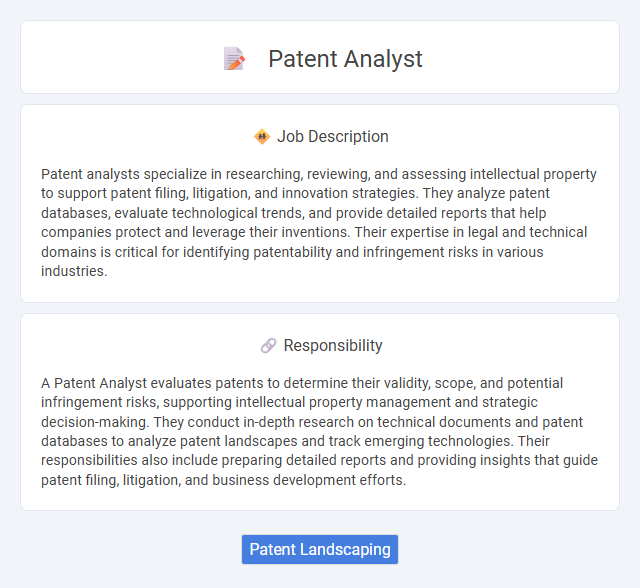
Patent analysts specialize in researching, reviewing, and assessing intellectual property to support patent filing, litigation, and innovation strategies. They analyze patent databases, evaluate technological trends, and provide detailed reports that help companies protect and leverage their inventions. Their expertise in legal and technical domains is critical for identifying patentability and infringement risks in various industries.
Individuals who possess strong analytical skills, attention to detail, and a background in science or technology are likely well-suited for a patent analyst job. Those comfortable with extensive research, data interpretation, and legal documentation may find this role fitting to their abilities. People with a preference for routine, structured tasks and an interest in intellectual property might thrive in this position.
Qualification
A patent analyst typically requires a strong background in science, engineering, or technology, often holding a bachelor's or master's degree in fields like biotechnology, chemistry, or electrical engineering. Proficiency in intellectual property law, patent databases, and technical writing is essential to evaluate patent applications effectively. Experience with patent search tools such as Derwent Innovation or PatBase and strong analytical skills improve the ability to assess patent validity, infringement risks, and competitive technology landscapes.
Responsibility
A Patent Analyst evaluates patents to determine their validity, scope, and potential infringement risks, supporting intellectual property management and strategic decision-making. They conduct in-depth research on technical documents and patent databases to analyze patent landscapes and track emerging technologies. Their responsibilities also include preparing detailed reports and providing insights that guide patent filing, litigation, and business development efforts.
Benefit
Patent analyst roles likely offer significant benefits such as enhanced expertise in intellectual property laws and the opportunity to work closely with cutting-edge technology developments. These positions might provide strong career growth potential and job stability due to increased demand for skilled professionals navigating patent landscapes. Professionals in this field probably enjoy benefits like competitive salaries and the chance to influence innovation through strategic patent evaluation.
Challenge
A patent analyst job likely involves navigating complex technical documentation and interpreting evolving intellectual property laws, making problem-solving skills essential. The role probably demands attention to detail to identify subtle differences in patent claims and assess potential infringement risks. Candidates might frequently encounter tight deadlines, requiring efficient time management and adaptability to shifting project priorities.
Career Advancement
Patent analysts play a crucial role in evaluating and interpreting patent documents to support intellectual property strategy and portfolio management. Career advancement opportunities in this field often lead to roles such as intellectual property managers, patent strategists, or senior analysts specializing in niche technology areas. Developing expertise in patent law, technical domains, and data analysis significantly enhances prospects for progression into leadership and consultancy positions within corporate or legal environments.
Key Terms
Patent Landscaping
Patent analysts specializing in patent landscaping conduct comprehensive evaluations of patent portfolios to identify trends, technology gaps, and competitive intelligence within specific industries. They utilize advanced data mining tools and patent databases to map innovation cycles and forecast emerging technologies, aiding companies in strategic decision-making and IP management. Expertise in patent landscaping enables analysts to provide actionable insights that drive R&D direction and protect intellectual property assets effectively.
 kuljobs.com
kuljobs.com